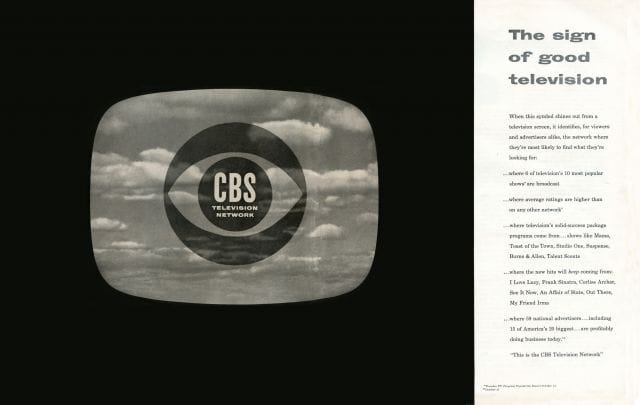Episodes: Why Netflix is CBS

Today, after I linked to an article I wrote about how I have a lot of streaming skepticism, particularly when you compare this era to the home video era, follower @RevDJEsq asked me if we were headed back to the era of the "Big Three," with three main broadcasters, and then a bunch of other random competitors who came and went until there was a major breakthrough in broadcasting. I half-suggested he could be right, then thought about it some more and realized that the three major streaming services are filling market niches remarkably similar to those of the original three networks.
To whit:
Netflix is CBS: It's easy to forget this now that CBS is synonymous with crime procedurals, but for most of the history of television, CBS was the network of quality TV. It didn't really have a serious challenger for the title until NBC in the 1980s, and CBS never really gave up the fight. Even in this era, it's broadcast things like The Good Wife and Mom and Person of Interest, really interesting shows that pushed the limits of broadcast TV. A big reason for this was that CBS got there first, got there biggest, and got there right away. CBS was pretty much the only game in town for a long time if you wanted to do big, ambitious television, and it was the default place people with new and exciting shows went. It was also a place that was willing to cancel a bunch of successful shows in hopes of suddenly becoming even more creatively successful (the famous rural purge of the early '70s). Does that sound like any streaming services you know? Yep.
Hulu is NBC: This is, admittedly, the comparison that's most specious here. NBC's primary quality for much of its lifespan was "we are not CBS," and that's not quite what Hulu is offering. (Indeed, the product that Hulu offers is pretty different from what Netflix offers!) But Hulu does have a sort of anti-Netflix thing going on, particularly in its insistence on building its catalog offerings up as much as possible (while Netflix skews more toward originals) and in its belief in releasing its shows one episode per week. If historical CBS was the three-ton gorilla that bestrode television like a colossus, then NBC was the network that learned to be smart about scooping up CBS's scraps. And that definitely describes Hulu.
Amazon is ABC: I got some pushback on this, but I think it makes sense. For one thing, ABC was historically the third-place network. (It didn't top the ratings until the '70s, which is nuts!) And while Amazon has more subscribers than Hulu, all available evidence we have is that Hulu has more total views (because lots of people don't pay for Hulu subscriptions). Plus, the foremost quality of ABC historically was that it was the network that just threw stuff at the wall to see what would happen. That sometimes resulted in disaster, and it sometimes resulted in brilliant television. I can't think of a better descriptor of Amazon's programming strategy right now.
Fandor is PBS: I just wanted to bring up Fandor, which is a really great service nobody's ever heard of. If you're a cinephile, it's worth a look.
Yahoo! Screen is Dumont: I will never resist a sick Dumont Network burn.
Broadly speaking, I would classify these niches as "the giant," "the underdog," and "the maverick." And if you look at TV history, these three basic types of networks keep popping up. You have giants like HBO and CNN, underdogs like Showtime and MSNBC, mavericks like Starz and Fox News. For whatever reason, we keep coming back to those basic network types. Hell, when Rupert Murdoch invented the Fox TV network, it was like the TV gods didn't approve of these things not coming in trios and, thus, came up with an underdog (The WB) and maverick (UPN) to complete the set.
I strongly believe that TV history is weird and cyclical, and that it runs in patterns that are observable if you just pull back far enough. Obviously, not everything is exactly the same. But the more you look, the more you might start to see similarities between the world of right now and the world of back then.
Or, put another way, we have a tendency to think of ourselves as the most sophisticated TV viewers who have ever lived, living through a new Golden Age. But a lot of what we enjoy is just souped up versions of stuff from the past, things that will seem laughable to our grandchildren. Looking backward is just as good of a way to remind ourselves this isn't true as looking ahead.
--
Episodes is published daily, Monday through Friday, unless I don't feel like it. It is mostly about television, except when it's not. Suggest topics for future installments via email or on Twitter. Read more of my work at Vox Dot Com.




